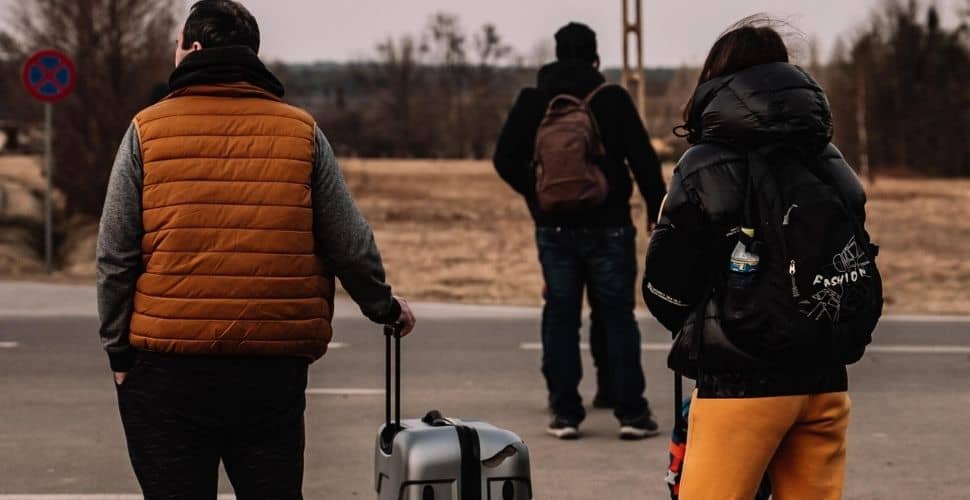This week, the Homes for Ukraine scheme launched in the U.K. The program will allow people in the U.K. to offer their homes to Ukrainian refugees fleeing from war.
But the Independent reports that the lack of a robust vetting process to determine who should be able to sponsor refugees is a serious flaw in the scheme, leading charities to warn that the scheme may present an “opportunity to turn a profit at the expense of vulnerable individuals” if there are no checks in place.
Homes for Ukraine
Under the Homes for Ukraine scheme, the expectation is people will offer a rent-free space in their home or a separate residence for at least six months. Notably, the scheme has come under criticism for placing the onus on the public to offer housing to refugees while the responsibility to set up refugee protection systems that are fit for purpose should lie with the government.
Those who do take part in the scheme will receive a “thank you” payment of £350 a month for as long as they host individuals or families. Within the first 24 hours of its launching, more than 88,000 people signed up to take part in the Homes for Ukraine scheme.
“Lessons from the past”
The scheme is said to have been built on the lessons learned from the Afghanistan evacuation last summer. “The changes we’ve made to the visa process are making it quicker and simpler for Ukrainians to come here, as well as ensuring those already here can stay” said a Home Office spokeswoman.
Though the Home Office claims they have learned from mistakes of the past, it begs the question of what they are doing to better serve the Afghani refugees whose lives are in limbo in the U.K. today.
“When the Afghan evacuation happened, it really touched a sympathetic nerve and 1600 people applied to host with Refugees at Home.”
This initiative is eerily similar to the initiative created for Ukrainian refugees, however, the hosts that offered accommodations have not actually been able to help resettle Afghans.
The Labour MP, Mick Whitely, stated that he places little confidence in the Home for Ukraine scheme due to the recent inaction on welcoming refugees fleeing from Afghanistan.
He recalls the government’s failures in the Afghan Resettlement Scheme which promised to resettle up to 20,000 people over four years. Meanwhile, today there are thousands of Afghans are stuck in U.K. hotels as the resettlement plans have stalled.
Others have expressed concern that the government struggled to establish effective partnerships with local authorities to provide the adequate support Afghani refugees needs, and those similar issues will result with the Homes for Ukraine scheme.
Further, the scale for this initiative is much larger since there is no limit to how many Ukrainians can enter the U.K. under this program, which separates this initiative from programs in the past where refugees were required to prove familial or other links to the U.K.
Reasons to be concerned
What is perhaps most concerning about the foreseeable issues arising with the scheme is that Ukrainian refugees could be put at risk of exploitation and abuse.
Many experts and charities have cautioned that though the scheme is well-intentioned, it is not an end-all fix-all. With the larger than usual number of applications needing to be processed, red flags could be missed when vetting potential hosts.
To mitigate the risk of placing refugees in situations where they could be exploited, abused, and even trafficked, there must be rigorous safeguarding measures and follow-up checks.
Daniel Sohge, the director of pro-bono consultancy Stand For All said that the Home for Ukraine scheme raises a number of concerns, the most significant being the danger of refugees being exploited or trafficked.
He warned that without proper support and safeguards, risky situations such as the one we are witnessing with Afghani refugees, particularly children being put up in hotels, could multiply given the larger scale of the Home for Ukraine scheme.
Why we need to heed warnings
The U.K. government is depending on organizations and charities to “match” the refugees to potential sponsors. They are also anticipating that the organizations and charities will be the ones to conduct the multiple checks.
However, Sohge stated that the speed and scale of the scheme borders on impossible to properly carry out those checks making it certain that red flags will be missed.
It is imperative that rigorous checks and safeguarding measures are put in place and are continuously practiced throughout the duration of the Home for Ukraine scheme. Though the program may be well-intentioned, there is definite cause to proceed with caution.







Freedom United is interested in hearing from our community and welcomes relevant, informed comments, advice, and insights that advance the conversation around our campaigns and advocacy. We value inclusivity and respect within our community. To be approved, your comments should be civil.